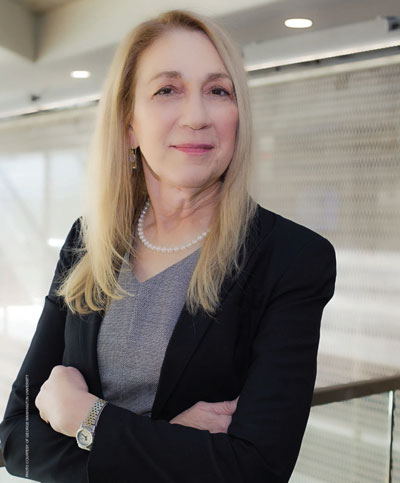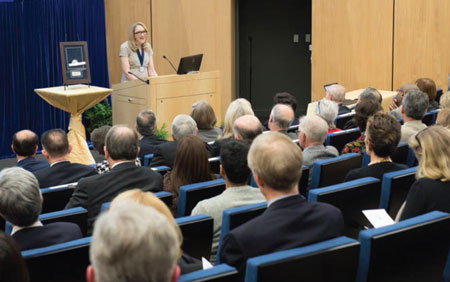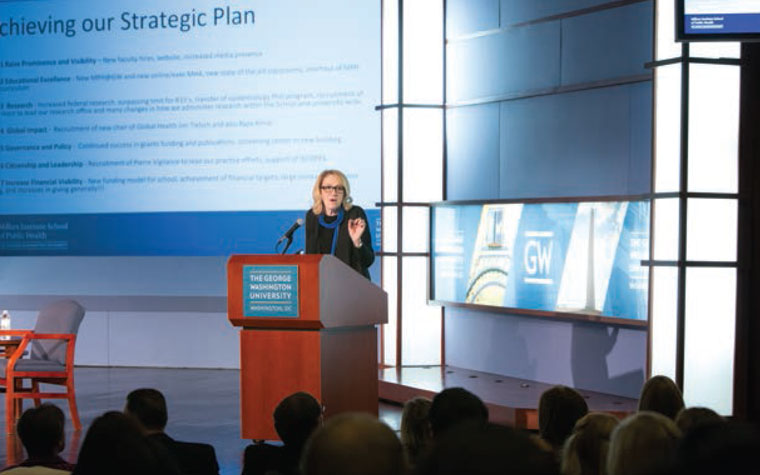Leading the national conversation on public health, Lynn R. Goldman keeps the fire burning
When Lynn R. Goldman applied to college back in the early 70’s, she wrote about saving the world for her entry essay. Now, decades later, in her current position as the Michael and Lori Milken Dean at the Milken Institute School of Public Health at the George Washington University (GW), Dr. Goldman is still passionate about, and dedicated to, making the world a safer and healthier place for all. Goldman directs an outstanding faculty, who are committed to training the next generation of leaders in the public health arena, worldwide.
Goldman’s academic background and inspiring career is astounding: She has an M.S. in Health and Medical Science from the University of California, Berkeley; an M.P.H. from the Johns Hopkins University, as well as an M.D. in pediatric and preventive medicine from the University of California, San Francisco. She has been recognized by the National Library of Medicine for being one of the most “influential physicians of our time,” and her remarkable story is included as part of their permanent exhibition, Changing the Face of Medicine : Celebrating America’s Women Physicians. While Dr. Goldman admits to not having had a master plan when she started out, but knew that she wanted to follow her passion.“ Every day, I wake up, excited about the work I do.”

Dr. Lynn Goldman (Photo Courtesy of George Washington University)
Approachable and soft-spoken, Goldman chats from her office in Washington, DC, sharing tales about her idyllic young life growing up in the 50’s on Galveston Island, Texas, situated in the Gulf of Mexico, She felt like she was part of a unique subculture there, “ a world unto itself.” Goldman didn’t always see herself pursuing a career in medicine or public health. “I was not one of those child prodigies who sat around all day long reading medical journals,” she says laughing. In high school, Goldman remembers excelling at math but not particularly liking her science classes.“ The Magic of science didn’t come across in my early education,” she explains.
Goldman spent much of her free time as a child playing with her four younger brothers, beachcombing, observing birds, and bicycling , but she was always aware of the unusual smells and rainbow of colors emanating from the chimneys of the enormous oil and chemical production plants across the bay. Spending much of her time outdoors, and being connected to nature, Goldman eventually gravitated towards environmental studies in college.
Goldman’s parents were healthcare professionals-her mother was a nurse who later became a social worker for Child Protective Services, and her father was a pediatrician. Both supported her in all of her educational endeavors. As it happened, the three eldest children in the family attended medical school.
Entering college as a math major, Goldman took a break to work at the Berkeley Free Clinic, and then returned to school at the University of California, Berkeley, two years later to pursue a B.S. in conservation of natural resources. As an undergraduate student, Goldman remembers being significantly taken aback when leafing through the U.S. Atlas of Cancer Mortality and discovering that high rates of bladder cancer and leukemia were shown around her birthplace, Galveston Bay, as well as the San Francisco Bay Area, Southern California, and the Mississippi Gulf Outlet Canal. This piqued her interest and fueled her desire to become more involved in public health. After graduating, she journeyed to the east to Baltimore and enrolled at Johns Hopkins University earning her a M.P.H.
Her future was wide open – so she ventured back west to study at the University of California, San Francisco School of Medicine to pursue an M.D. Although it was challenging for a woman in medicine, Goldman found support during her time there- an internist and advisor helped her navigate through the hardships of being part of, what was then, a male-dominated profession. Despite incidents of harassment during several of her clerkships, Goldman loved clinical medicine and completed her residencies in pediatrics and preventive medicine.
By the end of medical school, she had spent time at the state health department for some of her electives, and “really fell in love with the idea of getting a job there,” which she did, after graduating. At the California Department of Public Health, Dr. Goldman became the head of Occupational and Disease Control, conducting pubic health investigations on pesticides, childhood lead poisoning, and other environmental hazards. One week into the job, she had her first outbreak to deal with. Her colleague, Dr. Richard Jackson coached her in handling the media, and encouraged her along the way to regularly publish her work- advice that served her well, years later when she switched to academia.
A trailblazer, in her own right, Goldman became the first physician to head the Environmental Protection Agency’s (EPA) Office of Chemical Safety and Pollution Prevention, as assistant administrator under the Clinton administration. During her time there, Goldman promoted pesticide legislation reform, which led to the national implementation of chemical and pesticide safety and pollution prevention laws. At the end of the millennium and into the next, Goldman’s career path changed course again when she entered the world of academia, landing a position as professor of environmental health sciences at Johns Hopkins Bloomberg School of Public Health.

(Photo Courtesy of George Washington University)
Since becoming Dean of the Milken Institute School of Public Health at GW in 2010, Dr. Goldman has gained a broader perspective of the developments across the entire spectrum of public health.
“I see more clearly, the longer term trends occurring in our country about public health, “ she says. “Historically, in this country, medicine and public health have been separated from one another. There’s also been a split between private individualized healthcare systems versus community-based government health systems. Over the last few decades those systems are coming together.”
Public health students at GW are able to immerse themselves in many local public health initiatives such as the Age-Friendly project which has the goal of making Washington a city, where residents over the age of 50 have easy access to good medical care and nutritious foods within walking distances, allowing them to live happier more independent lives.
For Dr. Goldman, public health is also about “ promoting a culture of health” across the nation and globe.“ “You hear a lot about precision medicine but what we like to talk about is precision health and precision prevention, which means becoming smarter about targeting prevention efforts to specific communities, ” she says. This is the direction that public health is going- and Goldman fully embraces it.
She’s extremely appreciative of philanthropists like Michael Milken and his family, who keep the ball rolling, funding research to promote wellness and prevention. Goldman hopes that the next generation of philanthropists who will benefit from his work will realize, these individuals will realize that there are no quick solutions that will affect sustainable change. “ We still have no cure for many diseases- the treatments have gotten better but some of what we need is not just money but cohort studies and research that takes time,” she remarks.
The only time Goldman pauses is when asked about her own successes as a renowned leader in the field – “ I think the one thing that I’ve done right is that I always try to have a balanced focus on the job that needs to be done but I also carve out time for longer range issues that are important, “ she says. It’s always good to keep the fires burning.”
In addition, as part of her contributions to the Milken Institute School for Public Health, Goldman has, in a short time, developed the online programs, where there are more public health students registered online than in residential programs- totaling more than 2300 students.
When she is not leading the next generation of public health practitioners or writing for the Huffington Post on current and pressing public health issues, she is on the governing board of the National Academy of Science and is also a trustee for the Environmental Defense Fund. She has received numerous awards and honors, including the 2009 Heinz Award given to innovators addressing global change.
Most of all, Goldman loves to talk about her 20 year-old-daughter, Hannah, who is a freshman in college, pursing a degree in psychology. Goldman thinks about Hannah’s future, and the future for all children. “Wouldn’t it be great if our kids could live their lives cancer free?”
> This article by Rena Godfrey appeared in the Pre-Spring 2017 issue of Lifestyles Magazine.
